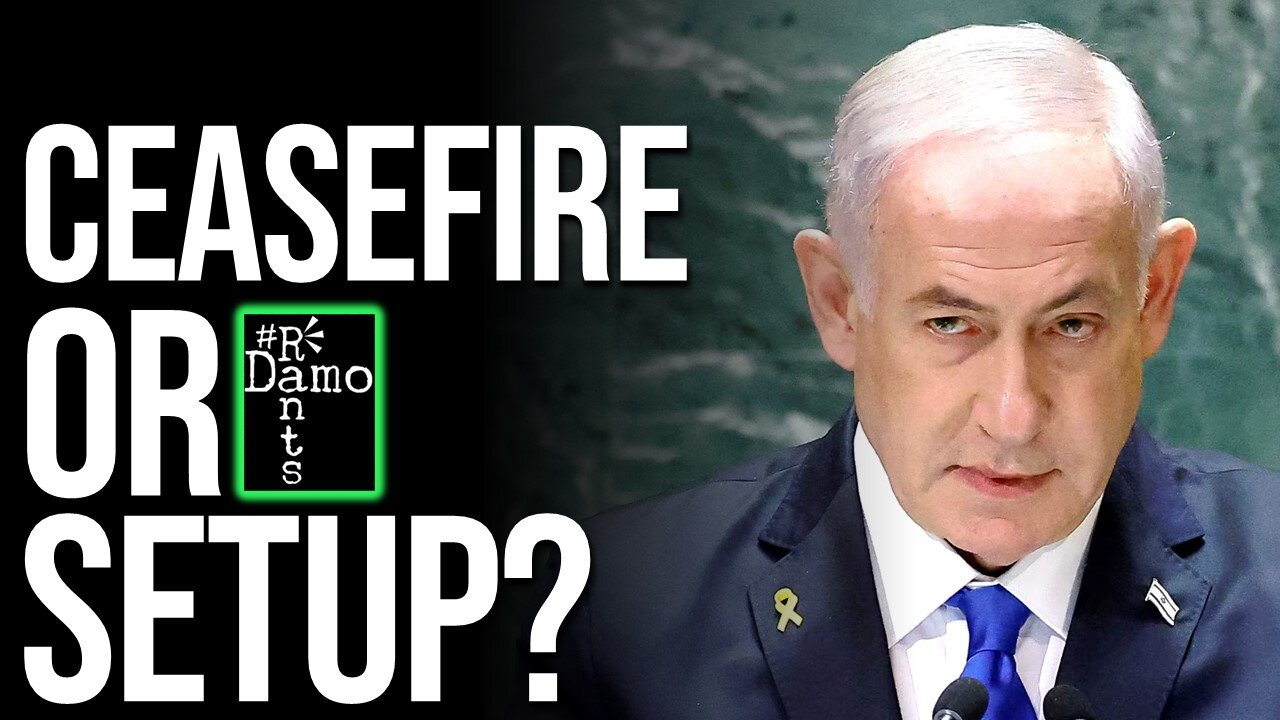Premium Only Content

How Can Iran Have Broken A Ceasefire They Never Agreed To?
Right, so if peace suddenly breaks out in the Middle East and no one believes it, did it really happen? That’s the paradox Israel and the United States tried to force-feed us with their abrupt announcement of a ceasefire between Israel and Iran — one so sudden, so suspiciously timed, and so utterly uncoordinated that it almost fell apart before it began. Trump announced it. Netanyahu smirked through it you might imagine. Iran, didn’t have a scooby about it, had no idea, had not been consulted. They thought fine, we’ll go along with this, but perhaps wondering if this is a false flag they can smell or whether the dog had done something dirty on the Persian rug? And within hours, jets were back in the air, accusations were flying, and the entire charade seemingly collapsed like a house of cards in a sandstorm, that said, matters calmed down as Trump seemingly tugged Israel’s leash again.
This is a ceasefire hurriedly formed without agreement, trust, or sincerity so is it really a truce, or just more theatre? More performance? Netanyahu has been performing this exact routine for years, using ceasefires in Gaza, as a for instance, not as stepping stones to peace but as political props to dodge scrutiny and flip blame. Now, the same playbook is being dusted off for Iran, complete with a media chorus, Western condemnation, and a conveniently timed ceasefire that seemingly came with a false flag twist.
What follows may instead of being a diplomatic breakthrough, end up being a carefully choreographed charade designed to manipulate headlines, take control of and manipulate the narrative to justify further aggression later, and rebrand the instigator of all of this, Israel, as the victim. So if this latest “peace” effort feels fake, performative, and vaguely familiar — it’s because it is. Welcome to Act Two of Netanyahu’s war-time theatre with regards to Iran. We’ve seen his commitment to ceasefires before, what makes this one any different?
Right, so last night our time, the world began blinking in disbelief franky, as a ceasefire was apparently declared between Israel and Iran. Heralded by Donald Trump as the conclusion of a twelve-day war as he’s called it, this sudden announcement seemed, on its surface, like, certainly a welcome de-escalation, though for those of us who’ve been observing Gaza for the last 20 months, also the ceasefire in Lebanon, and seen Israel violate them with impunity, we might be looking at this rather jadedly. But within mere hours of it supposedly coming into effect, the so-called truce apparently shattered. Jets were back in the air on their way to bomb Iran again, accusations mounted, and the mask of diplomacy fell away to reveal a rather familiar play by Israel, raising suspicions about what this really was: not peace, but performance—another act in Israel’s long-running playbook of narrative control and strategic deceit. If this was diplomacy, it was diplomacy by coercion, dishonesty, and manipulation. And at its centre, as ever, stood Benjamin Netanyahu.
To understand how this ceasefire almost collapsed as quickly as it began, let’s start by looking at how it came into being: not through negotiation or mutual agreement because there was none of that, but through unilateral declaration by the same powers that initiated the war. Israel started this with US help, then they suddenly decide to stop. Not very like Israel is it? According to multiple reports, Iran had not even been party to the ceasefire’s design. Tehran had reportedly received no plan, no draft, no diplomatic overture—just the sudden declaration that peace had been achieved. Iran, always stating that its condition for halting retaliation was the cessation of Israeli and US aggression, did in fact stop its fire when Trump’s 7am ceasefire time rolled around, they actually stopped firing some hours earlier around 4am. But as we now know, Israel did not.
This episode bears all the hallmarks of what Netanyahu perfected during Israel’s long-standing assaults on Gaza: escalate violence until global pressure builds, then call for or agree to a ceasefire at the precise moment it becomes politically beneficial to him, he’s running out of ammo, pressure to get some of the hostages home gets too much, that kind of thing. In Gaza, this tactic was employed repeatedly. Israel would launch brutal attacks, flattening neighbourhoods, hospitals, and schools. As international scrutiny intensified, Netanyahu would agree to a ceasefire. Ceasefires were called not to save lives, but to save face. And just as quickly as they were declared, they got broken, often with blame redirected toward Hamas, the Palestinians, or anyone except Israel, but unilaterally ending ceasefires in this day and age has not restored Israel’s desired victim status as planned.
We may now be seeing the same formula being applied to Iran. After launching unprovoked strikes on Iranian nuclear sites and assassinating key scientists, military personnel, and then of course as Israel always does, targeting civilian areas, Israel found itself on the receiving end of devastating retaliation which has gone on for the last 12 days now and included that attack by the US as well. Iran's Operation Glad Tidings of Victory, a strike on the US Al-Udeid airbase in Qatar, marked a turning point. Iran's military having already demonstrated its reach, precision, and resolve and just how easily it was tearing Israel apart this strike was different. This strike was pre-arranged and forewarned to both Qatar and the US and agreed to by all sides, as a face saving retaliation on a US target that had been cleared of personnel, completely avoided casualties but inflicted significant symbolic damage. But it was in the wake of this strike that Trump suddenly announced this ceasefire.
But how can there be a ceasefire between parties when one never agreed to the terms and what even are the terms? Tehran officials confirmed that no formal negotiations had occurred. Iran simply held its fire upon hearing that Israel might do the same essentially, stating if they stop firing we will and Iran had always said this, which is probably why Trump figured negotiation wasn’t required to stop this quickly. But within hours, Israel claimed that Iranian missiles had breached the ceasefire, prompting renewed strikes ordered by Israel’s mad Defence Minister Israel Katz on Tehran. Iran, for its part, denied any such launch. In fact, the Iranian military stated that Israel had already attacked Iran three times since the ceasefire was meant to begin, they’d actually kept attacking until 9am. Thus, it all started to crack up: Israel violates the ceasefire before it starts, then accuses Iran of breaking it to justify further attacks. People were readily screaming here is the false flag attack we’d been expecting.
And it’s because the pattern is disturbingly familiar that people thought this. As Mehdi Mohammadi, an advisor to Iran’s parliamentary speaker, warned, "Signals of de-escalation, ceasefire, non-retaliation, or anything of the sort coming from Trump or the regime are nothing but deception aimed at surprise and false gestures intended to intensify the conflict. If we are not smart, we will be dealt a heavy blow." Israel’s narrative pivots rely on one consistent tactic: claim victimhood while initiating aggression. As soon as Iran defends itself, Israel cries foul. This manoeuvre works best when the Western media echoes Israeli talking points, as it too often does, especially when US interests are involved.
The hypocrisy of this ceasefire and the caution that should be exercised with it cannot be overstated though. Israel, which initiated hostilities, offered Iran “peace” only after raining bombs on its infrastructure and scientists. The US, complicit in these strikes both directly and indirectly, participated in attacks on Iranian nuclear facilities including using bunker busters and B-2 bombers. The notion that the aggressors get to dictate the terms of peace here—all without negotiation, all without compensation, all without accountability—is not diplomacy. IWhat we’re seeing here is coercion wrapped in a press release.
But Iran understand this well. In agreeing to halt fire, Iran hopes to project reasonableness, but also holding firm that any further aggression would be met with proportional response. Iran’s official position was simple: stop firing, and we will too.
But we also all know that Netanyahu has little interest in real peace. For a man politically cornered, besieged by corruption trials, and presiding over growing civil unrest at home, war is not a liability—it’s all that’s keeping him in power. As with Gaza, conflict becomes a tool to divert attention from domestic scandals and consolidate support among the far right. A ceasefire that appears to make Netanyahu look reasonable is a carefully crafted illusion. It lets him posture as the mature actor, as someone who can be negotiated with, when the reality is he can’t and where he’s used ceasefires to lay traps for the likes of Gaza and Lebanon, they may be doing likewise for for Iran.
And the trap is clear: provoke Iran into breaching a ceasefire Israel never truly committed to, then use that as pretext to potentially resume resume bombing and there’s a few reasons to think that, that may be apparent already, which I’ll come onto in a moment.
Within the hour of the truce apparently collapsing though, Trump took to Truth Social, screaming to Israel “not to drop those bombs,” don’t wreck the ceasefire. Trump has been damaged heavily at home for wrecking that peacemaker image he’s carefully cultivated and he’d quite like it back and ending matters between Israel and Iran goes a long way towards that, but do his own interests supercede Israel’s at the end of the day and indeed those of his Zionist backers? There’s good reasons to wonder.
For instance, Trump’s prior calls for regime change in Iran—just days before this ceasefire declaration—does that reveal the strategic dishonesty of this whole affair or simply Trump’s bipolar approach to foreign policy and warfare? If the goal was peace, why deploy the aging USS Nimitz to the region amongst other assets. The Nimitz has been looked at as a potential false flag in the making since we learned of its deployment to the Middle East given it is due to be decommissioned next year Was it bait for Iran to strike? I don’t think they’d fall for that one, but Israel might strike it to create a false flag, but why put the vessel there to leave Israel to do that? If Trump is the sort prepared to drop bunker busters on nuclear facilities, perhaps he’d engineer an attack on his own vessel? Something akin to a Gulf of Tonkin moment to rally American opinion behind a broader war? The Gulf of Tonkin incident for clarification, was a false flag attack launched by the US against Vbietnam, claiming an attack by the Vietnamese on them, that in fact never happened, it was a manipulation of intelligence. In this day and age they might have to put on more of a show to pull a similar stunt off.
Israel’s desperation is easy to understand when you see the toll Iran has inflicted though and why they might actually want at least a breather if not a genuine end this time to hostilities. Iranian missile strikes have caused over $1.3 billion in damage to Israeli military and intelligence infrastructure, including successful hits on the likes Unit 8200’s headquarters, Mossad Headquarters and the Ministry for the Interior. This damage was not just financial—it was psychological. Iran demonstrated a capacity that Israel underestimated, breaching air defences and striking high-value targets. The illusion of invincibility surrounding Israel’s military has cracked completely and everyone in Israel now knows it.
And yet, rather than own its strategic miscalculation, Israel and its allies may still have chosen a well-worn path: blame Iran, shift the narrative, and claim victimhood. But this time, the world is less easily convinced. When Israel claims that Iran violated the ceasefire, yet fails to provide convincing evidence, the credibility gap grows and all the more so given Israel’s long track record of breaking ceasefires. It is also simply not in desperate Benjamin Netanyahu’s interests to end a war after 12 days that he’s wanted for 30 years, the destruction of Iran’s nuclear capabilities ended, when actually there is zero proof they’ve actually achieved that, despite claiming it. He also needs war to stay in power, ending war isn’t conducive to that, however the scale of damage on Israel has been huge, so perhaps in the grand scheme of things, in this case, he’s backing off. It’s very hard to take anyone’s word on such things at face value though, it’ll be in the days and weeks to come that it’ll be put to the test, to see if it holds.
As if to further complicate the picture all the more though, another possible false flag operation, reports emerged of Israeli drone strikes on radar systems in Iraq—Balad Air Base, Camp Taji, and Imam Ali Air Base. These facilities had the ability to monitor fighter jet activity. The attacks appear pre-emptive and surgical and certainly would benefit Iran, indicating a wider strategy of disabling regional detection systems to allow unmonitored Israeli operations. At time of writing nobody has claimed responsibility for those strikes though. So was that Israel, or someone else entirely?
What Israel and the US are practicing is not diplomacy. It is a form of weaponized negotiation, where optics matter more than outcomes and power overrides process. This is not about peace; it is about PR now. A ceasefire used to deflect blame, reframe aggression, and entrap the enemy into looking like the perpetrator is not a truce—it’s a trap. If Israel had been winning, they’d still be going.
If diplomacy is to mean anything again, it must be redefined around principles of accountability, sincerity, and mutual respect. Israel cannot be allowed to continue manipulating narratives with the tacit approval of allies and media who echo its script. If the global community wants to see peace, then performative politics must end—and real consequences must follow for those who instigate such strikes or seek to sabotage diplomacy and peace.
Iran, for all its flaws, did not start this war. It was struck first. It gave advance warning of its retaliation. It halted fire when told a ceasefire was beginning. They still look like the grown ups here. And still, it was blamed for ending the very ceasefire it never agreed to in the first place, almost derailing it before it ever begun. That’s not diplomacy. That’s deceit.
Should the current ceasefire collapse once more, it will be the inevitable outcome of a strategy rooted in manipulation, coercion, and calculated falsehoods that we’ve seen Israel do time and again before. Netanyahu’s government, in desperation to regain narrative control, will turn to the same tactic it perfected over Gaza which is to escalate, deceive, and cry victim. Trump will support them if they can manage this convincingly, he’ll want appropriate diplomatic cover. Given how badly Israel has been hurt in this conflict, this time could be different though.
Israel and Trump deserve no plaudits for performative peace however. They’re back to razing Gaza, they’re back to attacks in the West Bank, They are still as depraved as ever, but are back to punching down on those that can’t fight back, their favourite sort of opponent and accountability for that still seems far beyond reach.
Yesterday Netanyahu looked trapped by this war he’d started, he may be off the hook for it now, but whether matters stay that way is largely down to him. Get all the details of that story in this video recommendation here as your suggested next watch.
Please do also hit like, share and subscribe if you haven’t done so already so as to ensure you don’t miss out on all new daily content as well as spreading the word and helping to support the channel at the same time which is very much appreciated, holding power to account for ordinary working class people and I will hopefully catch you on the next vid. Cheers folks.
-
 LIVE
LIVE
GritsGG
6 hours agoRanked Top 70! Most Wins in WORLD! 3734+!
55 watching -
 LIVE
LIVE
LFA TV
1 day agoLIVE & BREAKING NEWS! | FRIDAY 10/17/25
768 watching -
 LIVE
LIVE
Joker Effect
39 minutes agoRUMBLE COMMUNITY STREAMING NEWS - CA BANS STAKE - ARC RAIDERS - KICK LOYALS TURNING! - NEW X ALGO
448 watching -
 1:04:41
1:04:41
BonginoReport
5 hours agoMichelle Obama Admits Affirmative Action Is A Scam - Nightly Scroll w/ Hayley Caronia (Ep.158)
96.4K38 -
 1:11:40
1:11:40
Kim Iversen
6 hours agoZelensky BLINDSIDED By Trump In White House Meeting | UK Bans RACIST JEWS From Attending Soccer Match
95.1K145 -
 3:10:25
3:10:25
Nerdrotic
6 hours ago $12.57 earnedRacist Academics Attack Tolkien | Hollywood to Strike AGAIN? | AI Doomsday - Friday Night Tights 376
97.7K6 -
 LIVE
LIVE
GrimmHollywood
21 hours ago🔴LIVE • GRIMM HOLLYWOOD • ARC RAIDERS •
86 watching -
 LIVE
LIVE
TheItalianCEO
6 hours ago24-hr Arc Raiders Stream
45 watching -
 27:49
27:49
Robbi On The Record
1 day ago $6.85 earnedRevelation, the End Times, and Satan’s Little Season part II - ft JT
46.6K9 -
 LIVE
LIVE
Mally_Mouse
1 day agoFriend Friday!! 🎉 - Let's Play! - Goose Goose Duck
39 watching